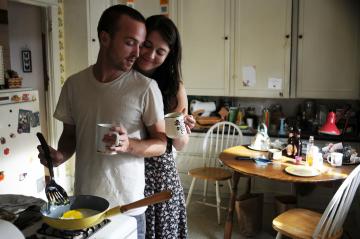Movie review: Upbeat 'Smashed' presents sobering look at alcoholism
One drink is too many, a thousand is never enough for Kate -- but who's counting? Certainly not Charlie, her adoring husband and fellow boozer in "Smashed," a compelling cautionary tale of (and primarily for) thirtysomething drinkers.
Each generation needs one. Or two. From "Lost Weekend" (1945) to "Days of Wine and Roses" (1962) down through the present, the lower dypso-depths are wherever you find them, including comfy Highland Park in northeast Los Angeles, where Kate (Mary Elizabeth Winstead) is a first-grade teacher.
She's a good -- if hungover -- one, who swigs a beer in her morning shower and needs a couple hefty gulps of whiskey from a flask in the car before facing her kids. But the binging catches up with her at work, and one boozy haze leads to a worse one on the street, an ongoing lie, a humiliating theft and a realization of just how low she has sunk.
It's critical mass. "I don't think I can do this anymore," she tells Charlie (Aaron Paul), and accepts a colleague's invitation to attend AA meetings. But the decision to get sober puts her marriage as well as her alcoholism to the test.
Indie director-writer James Ponsoldt is fascinated by addicts. His previous feature "Off the Black" (2006) was a similarly rough-around-the-edges portrait of an aging alcoholic (Nick Nolte) who gets a young friend to pose as his son at a high school reunion. The entry at hand, much praised at this year's Sundance festival, is a more curiously upbeat, seriocomic take on the subject.
Anyone who's ever been to an AA or NA meeting will recognize (and appreciate) Mr. Ponsoldt's painfully realistic rendering of that cathartic experience. "My name's Kate and I'm an alcoholic," she begins haltingly, "-- the words are weird." She'll soon be bonding with her sponsor (Octavia Spencer) and taking those tentative one-day-at-a-time steps to sobriety, with progress and setbacks plus a dawning, daunting awareness: "Now that I'm not drinking, I have all these other problems to deal with."
Chief among them is Charlie, her drinking buddy-hubby, codependent and enabling but also loving and fun. In "Wine and Roses," recovering Jack Lemmon famously put it to Lee Remick, "You remember how it was? You and me and booze -- a threesome." What do you do if your main bond is the bottle? For married alcoholics who rely on each other's understanding and automatic forgiveness, one spouse's opt-out for the wagon represents a kind of betrayal of the other.
Their conflict is sobering in more ways than one but not depressing, thanks to the terrifically naturalistic performance of Ms. Winstead, known -- if at all -- for roles in cult favorites such as "Grindhouse" (2007), "Scott Pilgrim vs. the World" (2010) and "The Thing" (2011). Most recently, she played Mary Todd Lincoln in the wacko-schlocko "Abe Lincoln: Vampire Hunter" -- no threat to Sally Field, as such. Here, Ms. Winstead finally gets a challenging role with Jekyll and Hyde contrasts between the bright, gifted woman at heart and the wild, foul-mouthed drunkard she becomes -- without looking or playing drunk in standard, predictable movie ways.
Mr. Paul is equally convincing as the likable layabout, more disturbed by his wife's sobriety than her addiction. Nick Offerman (of TV's "Parks and Recreation") is nerd-perfect as the sober but eternally ill-at-ease co-worker who makes Kate ill at ease, too; Megan Mullally as their overly nurturing Principal Barnes is delicious. But my favorite is the immortal Mary Kay Place (Loretta on the late great "Mary Hartman, Mary Hartman!" pseudo-soap series) as Kate's mom, who greets her daughter's first post-alcoholic appearance with, "This calls for a celebration -- let's have some bloody marys!"
"Smashed" comes dangerously close to a public service announcement. ("It's hard to quit, if you stop and start again, the disease picks up where you left off.") But what saves it, in addition to fine acting, is its acknowledgment and portrayal of liquored life as the fun it (often) is -- karaoke shenanigans at the bars, fond sloppy-drunk sex afterward. Kate has one of the script's best speeches, toward the end: "They say your best day drinking is worse than your worst day sober -- but it's not true! I had amazing times drinking, laughing, feeling like the most adorable, charming girl in the world, until ...."
The inevitable "until ...."
Mr. Ponsoldt's contribution to the cinema of addiction dares to embrace the deep ambiguities: His final lingering close-up of Kate's face (a bit like Garbo's at the end of "Queen Christina") suggests she has summoned the courage to change what she can, and found the serenity to accept what she can't, but that she's still working and praying -- like all of us -- for the wisdom to know the difference.






